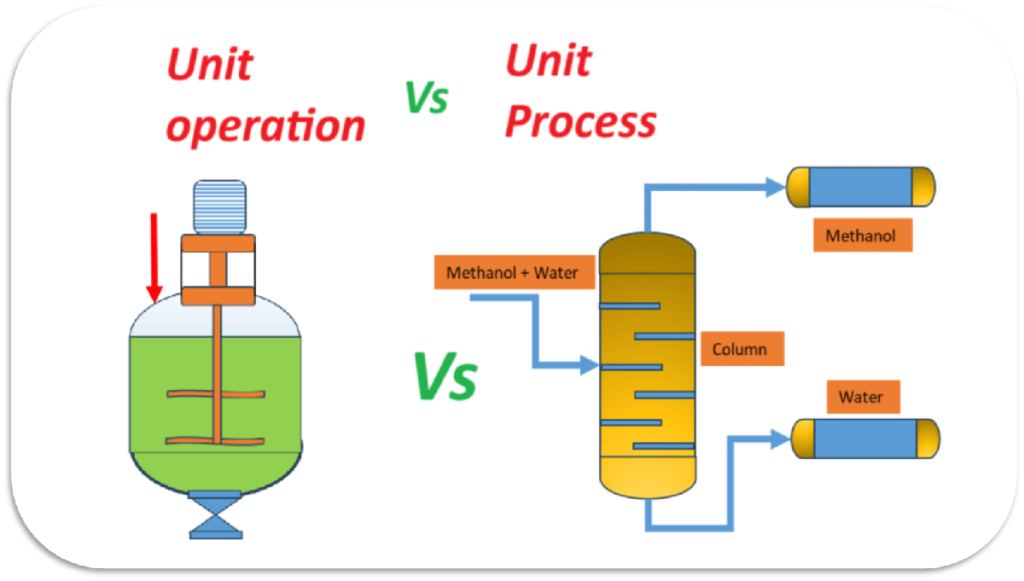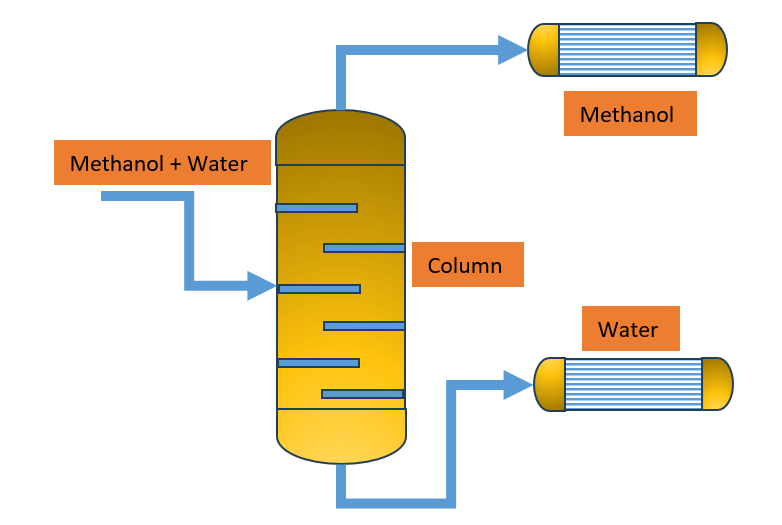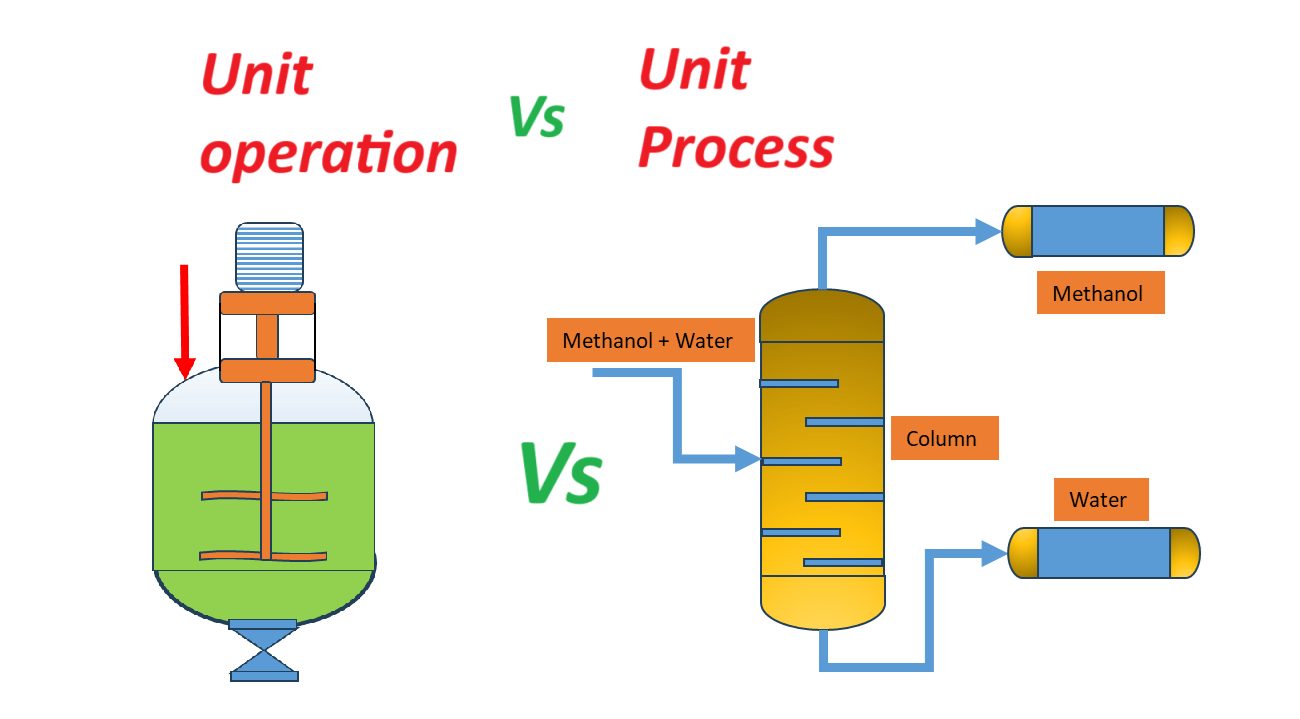Unit Operation And Unit Process | Difference Between
Hi readers, welcome back to my new article. I hope you are enjoying my articles. Today, we are going to discuss Unit Operation and Unit Process. I received good feedback and suggestions from you. For more feedback and suggestions, please email me at rbk04052018@gmail.com.

All chemical and petrochemical engineering is incomplete without knowledge of Unit Operation and Unit Process. So today, I will do my best to explain these concepts for chemical engineers. To build a strong career in chemical engineering, we should have certain skills, such as line sizing calculations and pressure drop calculations. I have already shared articles on these topics. If you haven’t seen them yet, please check the links at the end of this article.
To build a career in chemical engineering, especially as a process design engineer, you should have strong skills and detailed knowledge of chemical engineering.
In today’s article, I have covered detailed information regarding unit operations and unit processes in chemical engineering with examples. I am going to start with unit-operations first, where I will explain what a unit_operation is. In addition, I will also cover examples with detailed explanations. After that, I will discuss unit processes for chemical engineering with examples and detailed explanations about them. Later, I will cover the difference between unit operations and unit processes with examples. I will also try to explain the relationship between them. So, let’s start with unit operations first.
Table of Contents
Unit Operation
What is a Unit Operation?
A unit-operation is simply the basic step or operation that involves physical changes. Physical changes refer to changes in density, phase, etc.
Examples of unit-operations include filtration and distillation.
Let’s discuss more about the examples of unit operations to improve your knowledge and clarify your concepts.
Unit Operation Example Number 1 – Distillation of Methanol and Water
In the chemical industry, methanol is used as a solvent in many reactions, as well as for cleaning. After its use, it often becomes contaminated with water. Additionally, in some reactions, we need dry methanol. Therefore, it is essential to remove the moisture from methanol to make it dry and to improve its purity as per process requirements.
As you can see in the following diagram, in this operation, we feed the crude methanol (a mixture of water and methanol with some impurities) into the column. After distillation, we obtain pure methanol as per the process requirements, while water will collect at the bottom of the column or in the kettle.

Unit Operation Example Number 2 – Filtration Using a Water Purifier
We use water for drinking purposes, so to make it pure, we use a water purifier. A water purifier removes all kinds of impurities from the water and reduces its hardness to a drinkable level, normally between 40 to 70 ppm.
Unit Operation Example Number 3 – Sugar Crystallization
Crystallization is the separation of solid and liquid by forming solid crystals. This is also one type of example of a unit operation in chemical engineering.
Classification of Unit Operations
As per my knowledge, I am going to classify it based on their primary function. In addition to the above explanation, this classification will clear your doubt regarding unit operations.
Heat Transfer Operations
The main purpose of heat transfer unit-operations is to exchange heat. The heat is exchanged for different purposes, such as gaining reaction heat, heating the reaction or mixture to boil the liquid, melting the solid, and many more. Examples of heat transfer unit operations are condensation, which means condensing the fluid by applying cooling, and evaporation, which means evaporating the liquid by heating it.
Mass Transfer Operations
Mass transfer unit-operations involve the transfer of mass between phases. Examples of this include distillation and crystallization.
Unit Process
What is a Unit Process? A unit process is nothing but a reaction that results in chemical changes. For example, A reacts with B in the presence of catalyst C at temperature T and pressure P to form the main product D and byproduct E. All types of chemical reactions are examples of unit processes.
Let’s discuss the examples in more detail to gain clarity on unit processes in chemical engineering.
Unit Process Example 1 – Production of Sulfuric Acid
To manufacture sulfuric acid, we use sulfur dioxide (SO₂) and oxygen (O₂) as reactants. Vanadium(V) oxide (V₂O₅) serves as the catalyst, and the reaction typically occurs at a temperature of 450 °C and atmospheric pressure. After the reaction, we obtain sulfur trioxide (SO₃) and sulfuric acid (H₂SO₄) as products.

Unit Process Example 2 – Ammonia Synthesis by Haber-Bosch Process
Raw material are Nitrogen (N₂) and Hydrogen (H₂). In the prsense of Iron-based catalyst this two raw material react at the temperature typically around 400–500 °C and pressure in between 150 to 250 bar. And Ammonia (NH₃), as the main product get produce.
The typical reactor as below.

Unit operation and unit process in the oil and gas industry
Oil and gas are main types of industry for chemical engineers, especially for petrochemical and petroleum engineers to make their careers. So we need to have knowledge regarding the operations and processes used in the oil and gas industry. I have added this section as a bonus in this article to provide a quick overview of it.
In oil and gas – upstream operations like filtration and separation are normally used in the oil and gas industry.
In oil and gas – downstream industry operations like distillation and separation are used.
Differences between unit operation and unit process in chemical engineering
I have tried to explain it with help following table. please go through it.
| Term | Unit-operation | Unit Process |
| Definition | This the operation which involves the physical changes only | This the process which involves the chemical changes only changes only |
| Example 1 | Distillation | Hydrogenation |
| Example 2 | Filtration | Hydrogenation, |
Frequently Asked Questions
What is the difference between unit operations and unit processes?
In unit-process is chemical process results in change of chemical examples are bromination, chlorination, esterification etc. while in other hand unit unit operation is physical process, example filtration where we remove solid from liquid.
What is an example of a unit process?
All kind reactions are the examples of unit process. Like chlorination, alkylation etc.
What are the unit operations and unit processes in applied chemistry?
In applied chemistry are filtration, purification and distillation.
What are the unit operations and unit processes in metallurgy?-
In metallurgy, common unit operations include are Crushing, Smelting ,Refining:
Is distillation a unit process?
No it not process it is operation. It involves physical changes only.
What are the 5 examples of process?
Combustion, Polymerization, Hydrogenation, Nitration, Fermentation.
What is role of heat exchanger in unit operation and process.
A heat exchanger plays a vital role in both unit processes and unit operations. In unit processes, it supplies the necessary heating and cooling to facilitate chemical reactions. In unit operations, it provides heat for evaporation and cooling for condensation, ensuring efficient temperature control throughout the process.
Pro Tips to crack Interview
We have already talked many times about the importance of having knowledge of operations and processes as a chemical engineer, especially in the oil and gas or chemical industries. Before attending any interview, write down all the operations and processes you have worked on. If you have mentioned these in your resume, make sure to prepare for questions about them. Interviewers may ask you about this. Additionally, review the job description for any specific operations or processes you should also prepare for.
Always prepare from both sides: your resume and the job description. There is often a gap between what’s in your resume and the job description, but you should still have knowledge of the required areas.
For example, if your resume states you have experience in distillation and filtration, but the job description requires knowledge of crystallization and hydrogenation, then research and cover the basics of these as well. In the interview, you could say, “I don’t have hands-on experience with crystallization and hydrogenation, but I have a basic understanding of them.”
If you have any questions, please feel free to ask. You can simply comment below or reach me at rbk04052018@gmail.com.
Conclusion
Unit operation and unit process, along with examples and differences, are important for building a strong career in the chemical and oil & gas industries. We have learned that unit operations involve physical changes, while unit processes involve chemical changes. All types of reactions are examples of chemical unit processes, while filtration and distillation are key examples of unit-operations.
I hope you enjoyed this article. I have tried to cover the key information in a concise and simple language, especially for readers from India. I would appreciate your suggestions for improvement and updates. Please comment below, and for any queries, feel free to contact me at rbk04052018@gmail.com.
Top Google Search For it.
Unit operation and unit process example
Read Also,
Line sizing in the process industry
Vertical Centrifugal Pump Working
Discover more from Technical Guide
Subscribe to get the latest posts sent to your email.


Hi sir,
I am writing you from Gabon (Africa). I hold a National Diploma in Chemical Engineering and Always eager to learn to improve my knowledge and skills. I thank you a lot for sharing and hope to receive other materials soon.
Thank you so much for your valuable feedback. We are doing our best and are working professionals managing this part-time based on our availability.